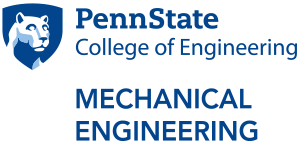Core Courses
All mechanical engineering core courses are offered in both fall and spring semesters, and several are offered in the summer. Students must pass prerequisite courses before enrolling in a course. Please refer to the University Bulletin for prerequisites needed prior to registering for a course. All core courses require a C or better for graduation.
ME 300: Engineering Thermodynamics I (3 cr)
Basic thermodynamic concepts, first and second law of thermodynamics, properties of pure substances. Sample syllabus »
ME 320: Fluid Flow (3 cr)
Thermodynamic and dynamic principles applied to fluid behavior; ideal, viscous, under internal and external flow conditions. Sample syllabus »
ME 330: Computational Tools (3 cr)
This course gives students physical insights as well as introductory skills on the use of modern computational tools in solving mechanical engineering problems. The course has two main thrusts: 1) finite element analysis for structural/thermal mechanics and 2) computational fluid dynamics for fluid flows. Sample syllabus »
ME 340: Mechanical Engineering Design Methodology (3 cr)
The design process, problem definition, conceptual design, system design, detail design, evaluation and test, implementation, documentation and communication. Sample syllabus »
ME 348: Circuit Analysis, Instrumentation, and Statistics (4 cr)
This course is required for all mechanical engineering students, and is taken in the junior year. It serves as an introduction to the fundamental principles of circuit analysis, instrumentation and measurement, as well as statistics. Sample syllabus »
ME 360: Mechanical Design (3 cr)
Specification of components such as shafts, bearings, and power transformers; optimal designs for operational, environmental and manufacturing requirements. Sample syllabus »
ME 370: Vibrations of Mechanical Systems (3 cr)
Vibration characteristics of dynamic systems with and without damping; vibration isolation, vibration absorbers; classical Laplace transform; matrix digital computer methods. Sample syllabus »
ME 390: Academic and Career Development for Mechanical Engineers (0.5 cr)
This course guides students through the process of tailoring their academic studies to suit their individual career goals. Students will look at career opportunities within mechanical engineering as well as the many other professions that are available to BSME degree holders. Sample syllabus »
ME 410: Heat Transfer (3 cr)
Transient heat conduction; convection in laminar and turbulent flow; heat exchanger devices; boiling and condensation; radiation. Sample syllabus »
ME 435: Mechanical Engineering Systems Lab (3 cr)
This course studies fundamental mechanical engineering subjects, including mechanics, dynamics, heat transfer, fluid mechanics, material science, and control in a holistic approach, through real-world systems in topics, such as energy and sustainability, autonomy and robotics, and big data. Sample syllabus »
Note: Beginning in fall 2022, students will take a 3-credit lab ME 435 to complete graduation requirements. Please refer to the University Bulletin for prerequisites needed prior to registering for a course.
ME 440W: Mechanical Systems Design Project (3 cr)
Design and analysis of mechanical components and systems. Application of fundamental design and analysis methods to open ended engineering problems. Sample syllabus »
ME 450: Modeling of Dynamic Systems (3 cr)
Modeling and analysis of dynamic interactions in engineering systems. Classical and state variable methods; computer simulation; stability and dynamic response. Sample syllabus »
ME 454: Mechatronics (3 cr)
This course addresses the need for today's mechanical engineer to understand the architecture of engineering systems and not just the mechanical hardware. The course has a significant lab component in the form of weekly, two-hour labs. Sample syllabus »
ME 490: Professional Development for Mechanical Engineers (0.5 cr)
This course provides a look at foundational business issues of importance to new engineers: creating value, organizational models, financial statements, and intellectual property. Students will get a preview of their role in today’s global workplace and how they can position themselves for success. Sample syllabus »
- Contact Us
- Academic Plans
- Core Courses
- Technical Electives
- Technical Electives Course Descriptions
- Technical Elective Groupings






